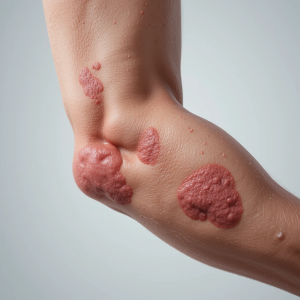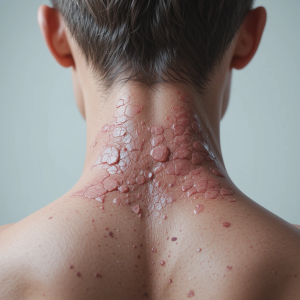Psoriasis Treatment, Symptoms, Causes & types
What Is Psoriasis?
Psoriasis Treatment is a chronic autoimmune skin disorder that causes the rapid buildup of skin cells, leading to scaling, inflammation, redness, and itching. It is not contagious but can significantly impact a person’s physical comfort and emotional well-being.
🔍 Common Psoriasis Symptoms
-
Thick, red patches of skin covered with silvery scales
-
Itching, burning, or soreness in affected areas
-
Dry, cracked skin that may bleed
-
Pitted, ridged, or thickened nails
-
Joint pain (in case of psoriatic arthritis)
Symptoms often appear on the scalp, elbows, knees, and lower back but can occur anywhere on the body.
⚠️ Causes and Triggers
Psoriasis results from an overactive immune system that speeds up the skin cell life cycle. While the exact cause is unknown, several triggers can worsen the condition:
-
Genetics: Family history increases risk
-
Stress: Can trigger flare-ups
-
Infections: Like strep throat
-
Weather: Cold, dry climates
-
Skin injuries: Cuts, sunburn, or bug bites
-
Medications: Lithium, beta-blockers, or antimalarials
-
🚨 Types of Psoriasis
There are multiple types of psoriasis, and recognizing them can help with effective treatment:
1. Plaque Psoriasis (Psoriasis Vulgaris)
Most common form — causes raised, red patches covered with silvery scales.
2. Guttate Psoriasis
Small, drop-shaped spots often triggered by bacterial infections.
3. Inverse Psoriasis
Smooth, red patches appear in skin folds like the armpits or groin.
4. Pustular Psoriasis
White pustules (blisters) surrounded by red skin.
5. Erythrodermic Psoriasis
A severe and rare type that causes widespread redness, peeling, and intense itching or burning.
🔬 Signs and Symptoms of Psoriasis
Symptoms vary by type and person, but commonly include:
-
Thick, red patches of inflamed skin
-
Silvery-white scaling
-
Burning, soreness, and itching
-
Dry, cracked skin that may bleed
-
Discoloration or thickening of fingernails or toenails
-
Joint pain in cases with psoriatic arthritis
Psoriasis can be cyclic — meaning flare-ups last for a few weeks or months, then subside for a while, and return again.
🤔 Is Psoriasis Linked with Other Conditions?
Yes. People with psoriasis are at higher risk for:
-
Psoriatic arthritis
-
Heart disease
-
Type 2 diabetes
-
Depression and anxiety
This makes managing the disease holistically — both body and mind — even more essential.
Dr. Jahangir Shah is a leading expert in managing psoriasis and other chronic skin conditions in Karachi. With years of clinical experience and a patient-centered approach, he has helped countless individuals find relief from painful flare-ups and regain healthy skin. Known for his advanced treatment methods and compassionate care, Dr. Shah is widely recognized as a trusted name in dermatology across the region.
-


